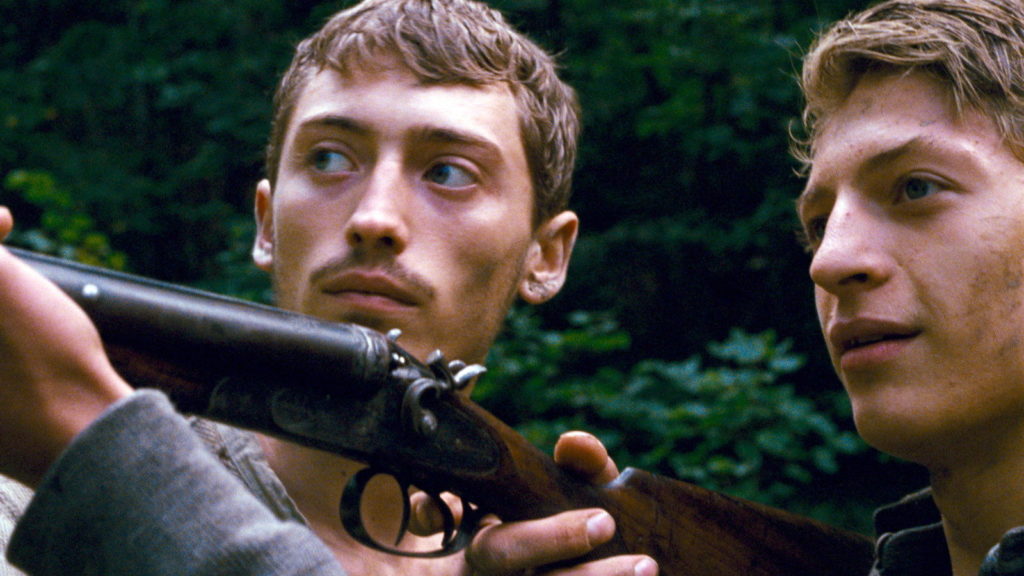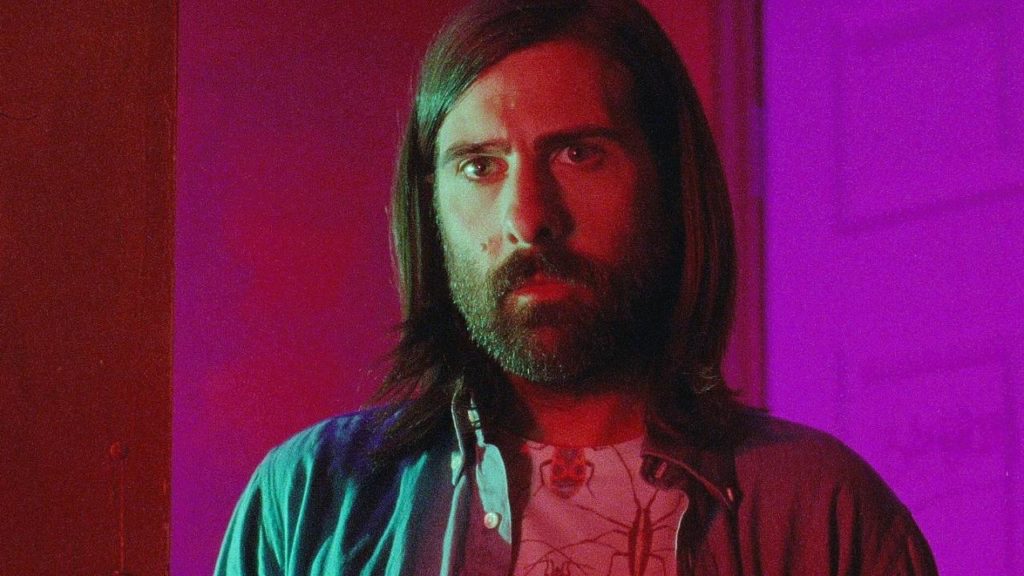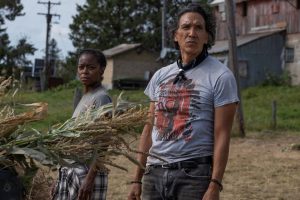Reviews include Superman, Apocalypse in the Tropics, and To a Land Unknown.
MDFF x TBLB and the Future of Toronto Film Programming
October 16, 2017
Tapping into exciting world cinema while it’s happening.
If you’re a cinephile in Toronto, you’ve probably heard of MDFF (Medium Density Fibreboard Films). The production company co-founded by Tower director Kazik Radwanski and producer Dan Montgomery has become the home for some of the boldest voices in English-Canadian cinema of the past ten years, both through its own productions — among them, Antoine Bourges’ compelling Fail to Appear, and Radwanski’s own Scaffold, recently shown at TIFF and NYFF — and its popular monthly screening series. From its humble origins in Double Double Land to its arrival at the far more expansive Royal Cinema, MDFF’s film programming has become a major platform for some of the best works of contemporary North American independent cinema, giving films by luminaries like Joanna Arnow, Khalik Allah, and Nathan Silver their Toronto premieres, as well as casting a spotlight on lesser-screened but critically lauded Canadian filmmakers, including Isiah Medina and Luo Li.
Earlier this month, the program moved to the simultaneously more imposing and more intimate space of the TIFF Bell Lightbox, relaunching as MDFF Selects in partnership with Cinema Scope Magazine. Angelo Muredda (full disclosure: a regular Scope writer) spoke to Radwanski and Cinema Scope contributor and editor (and TFCA member) Adam Nayman to get a feel for the newest incarnation of the series ahead of its second screening. They talked about the program’s new austere modernist digs, the magazine’s role in the program going forward, and MDFF’s mandate to balance films by emerging North American and international talents.
Can you talk about the decision to program Alessandro Comodin’s Happy Times Will Come Soon as your opener?
KR: It was a great example of the kind of film we wanted to bring to Toronto, being a part of this new wave of Italian cinema that I’m really excited about. It’s in that tradition of films like Pietro Marcello’s Lost and Beautiful, which played TIFF a couple years ago, and Michelangelo Frammartino’s Le quattro volte. I see it as a part of that wave — a missing piece.
That’s a lot of what this series is about: tapping into what’s exciting in world cinema while it’s happening, and not waiting ten years for these smaller films to be put into the chronology. Everything is 20/20 in retrospect, but we want to play these exciting films as they’re emerging, cultivating an audience that wants something a bit little unusual but exciting.

MDFF has been a staple of the Toronto film scene for a while, in part because of your curatorial taste. Do your instincts as a programmer change at all moving from a massive repertory theatre like the Royal to TIFF?
KR: Dan, myself, and [programmer] Blake Williams were all very conscious that we didn’t want to chase an audience. We don’t want to just get a bigger audience and lose sight of what we’re hoping to bring to theatres in the process. I don’t think that will change being at TIFF, but we will have more resources. A film like Happy Times Will Come Soon would have been difficult for us to negotiate without TIFF. How our series started was through American filmmakers who got what we were doing. But when it’s overseas and there isn’t an immediate connection it really is helpful to have even just the brand recognition of TIFF to help the series travel a bit further. It helps us cast a wider net and get films that we might not have been able to get otherwise.
Does the space you’re screening in matter?
KR: There was something really special about those early screenings at Double Double Land. We only had 50 people there, but every seat would be filled, and the filmmaker would be there. It felt pretty magical, like something was happening. You don’t get that feeling as often in a larger theatre. But in the downtown core of the city there aren’t as many places like that with character and atmosphere. A big part of the series has always been the social aspect, for our filmmakers as well as for audiences and film writers in the city more broadly. It’s important in a digital age, I think, to foster that feeling of community and encouraging dialogues about cinema, and we’re working on bringing that to the Lightbox as we have in the past.
AN: As somebody who used to attend and who has hosted MDFF screenings, it’s very easy to romanticize the small, hot, cramped, inaccessible room with bad projection. And in the moment it does feel romantic, and like it belongs to you. But there’s also something to be said for showing worthy and deserving films in worthy and deserving spaces, with excellent projection. There’s something vital about being outside of an institution, but it’ll be interesting to see how you keep that sense of vitality and fun and ownership when you go inside an institution like the Lightbox specifically.
TIFF’s year-round programming has come under fire recently in places like The Globe and Mail and Torontoist, whether it’s for diminishing numbers or the perception that it lacks an identity compared to other art house and repertory programming in the city. Can a program like this help?
AN: It’s instructive to look at what the Royal is doing. Having strong, visible programmers with recognizable identities and tastes who stand up in front of the film — not because they belong to the building necessarily but because the films are theirs — can only be a good thing. The question of how big a net that casts is worth thinking about. I’m interested to see whether being in a building like the Lightbox will move the needle for the base expectation over 6 or 9 months, or if it’s still a question of those same 75 to 100 people showing up and having a good time. It would be nice to see it swell beyond that.

How do you both see the MDFF and Cinema Scope partnership going forward?
KR: Cinema Scope performs a similar function as a way of navigating contemporary cinema, so as a partner they make total sense. A goal of the series is to have these movies exist in the city and to have their moment, encouraging opportunities for people to see them but also to publish about them and talk about them. We want to help document the experience of the film. The endorsement and the partnership of Cinema Scope means so much to us for that.
AN: It’s important to point out that Dan and Kaz have the infrastructure already, and that we’ve been brought on by them. But there’s an alliance there for sure. Dan, Kaz, Blake and some of the other programmers are people who have been written about in Cinema Scope or who have written for it. The argument could be made going forward that there might end up being some filmmaker relationships that the magazine makes easier. I won’t speak for [Editor in Chief] Mark Peranson, but from my perspective, this is great for us: it puts the magazine’s name, mission, mandate and reputation into a nice screening room attached to a movie people are excited to see. We also have so many good writers in the city that there are some natural opportunities for the magazine to become visible and show how it’s a part of this community.
KR: If something is written about in Cinema Scope, I’m interested in seeing it.
AN: Even Jackie.
A number of the staunchest fans of the series seem to be Toronto filmmakers. How important has it been for you to help foster a filmmaking culture in the city?
KR: I was definitely a cinephile before I was a filmmaker. I worked in a video store. But it was really only when we were distributing Tower, my first feature, and meeting filmmakers who made these films we loved, and who wanted to play them in Toronto, that we started thinking about facilitating that kind of culture. It started somewhere between learning how to distribute our own films and talking to other people who wanted a chance to screen theirs with Toronto audiences outside of TIFF.
AN: You’ve put together a very impressive list of American filmmakers who for whatever reason just never made it here to screens any other way.
KR: That’s partly to to with them being challenging films that aren’t championed, and partly to do with the transition to a digital world of cinema with Netflix distribution deals. But we’ve screened some important American filmmakers whose subsequent films have gone on to longer theatrical runs in Toronto, whether it’s films like Krisha and Queen of Earth, or Eliza Hittman’s first feature It Felt Like Love, which we co-presented with cléo.
AN: There is some awareness of a new Canadian cinema emerging in places like New York and Los Angeles. It’s not necessarily surprising to me that those Canadian films don’t always play in New York, but it’s amazing how many important films coming out of New York don’t get single screenings here.
KR: You realize setting up these screenings the hoops that a debut film has to jump through sometimes. That’s why it was so important for us, especially as filmmakers, for Toronto to be a part of the discovery process for these kinds of films outside of the festival.
Is there a sense of responsibility on your part, given your association with American independent cinema, to continue in that direction? Do you have to balance those selections with international cinema, or with other mandates?
KR: It’s definitely a balancing act. We really wanted to do a Hong Sang-soo film, for instance, which is a bit outside of our original mandate. It’s important for us to do a mixture of some Canadian and American films as well as internationals. We also have a mandate to screen films by female filmmakers, which usually happens very naturally.
AN: One of my favourite programs you’ve put together was your Jodie Mack screening. Those are the kinds of films that don’t screen in Toronto outside of a few nights out of the year at Wavelengths.
KR: We’re doing a similar program with Laura Huertas Millán, who had a short this year in Wavelengths, and who’s coming up from Colombia. We’re going to screen three of her films in November. It’s always a mixture for us of filmmakers like Alex Ross Perry, who has a following already, and Millán. We have very wide-reaching tastes. In the end it’s mostly about capturing a spirit or a sense of an ever-changing international cinematheque and thinking about what might be exciting — what might people want to see at the moment.
MDFF Selects returns on October 17 with Alex Ross Perry’s Golden Exit.



